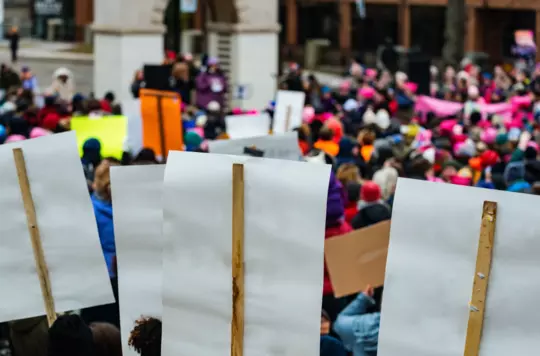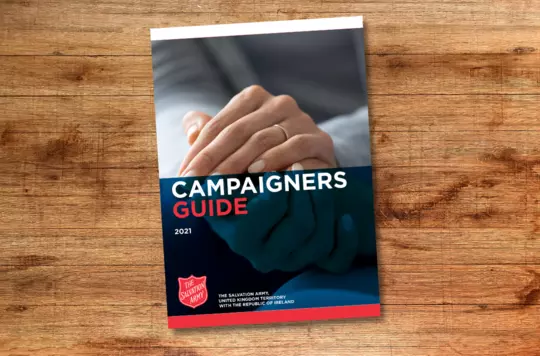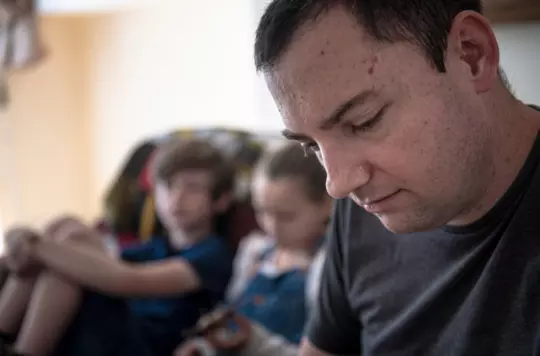13 February 2023
Modern slavery legislation: Taking a stand
Captain Marion Rouffet and Nick Herbert

As new legislation is touted in the media, Captain Marion Rouffet and Nick Herbert from the Public Affairs Unit (PAU) ask what we’re doing to stand with modern slavery survivors.
For more than 150 years, The Salvation Army has fought alongside people who face exploitation and abuse. One form it takes is modern slavery, which impacts the lives of thousands in every corner of the world, regardless of background.
In the coming weeks, the government is expected to set out plans in parliament aimed at tackling the number of small boat crossings in the Channel. Much like its predecessor, the Nationality and Borders Act (2022), the concern is that this proposed legislation will include measures that could cause harmful changes to the UK’s modern slavery support systems. These could make it harder for someone to demonstrate they are entitled to receive support. For instance, there have already been measures introduced that increase the burden of evidence upon survivors. This could continue the erosion of the world-leading protections for modern slavery survivors that The Salvation Army has seen in recent years.
The Army has held the Modern Slavery Victim Care Contract for more than a decade and through it provides specialist support to adult survivors of modern slavery and human trafficking in England and Wales. In this time, it has supported more than 18,000 people on their road to recovery. The Anti-Trafficking and Modern Slavery team sees the need every day for robust and inclusive systems to identify who needs support – we see it in the people who have been traumatised in the name of profit, and we see it in the lives that have been rebuilt.
The Army is deeply committed to fighting modern slavery and human trafficking. In the UKI Territory, that practical response in supporting victims forms part of this commitment, as does raising the voices of survivors. This stems from the biblical principles of the inherent and equal value of all people and Jesus’ command to love God and love and care for our neighbours.
The Bible is clear about the injustice of people being exploited or damaged for the gain of others. Few who have studied Jesus’ words and actions, or have read the words of the prophets Isaiah and Amos, would dispute that. As Christians, we must stand up and fight any plans to further remove the legal rights of those who have been exploited in the name of profit. As Salvationists, the Army’s position in society as a church and charity gives us a responsibility to speak out.
What is sometimes more difficult is the personal and collective challenge for us to speak out against injustices in the knowledge that those who do will face criticism. It takes far more courage to speak up than it does to stay silent and maintain the status quo. Yet as Christ’s followers we are challenged to live differently, to act with justice and mercy, to speak up for the vulnerable and the oppressed, and to pray without ceasing. As the theologian Walter Brueggemann wrote, ‘good things happen when silence is broken’.
Courage is more easily found when standing together. This is why, over the coming weeks, we are calling on Salvationists, faith groups, NGOs and members of the public to join us and survivors in communicating the need for positive change to government, whether that’s talking directly with their MPs or raising awareness among family and friends. How will you take a stand?
Reflect and respond
- Read Amos 5. Can we sincerely worship God if we pay no attention to the suffering of others?
- Read Proverbs 31:8 and 9. How can you raise awareness of modern slavery in your community?
- Visit salvationarmy.org.uk to sign up and keep in touch with the campaign and how you can lend support.
Written by

Captain Marion Rouffett
Corps Officer, Maidstone, and Public Affairs Officer

Nick Herbert
Policy Researcher, Public Affairs Unit
Discover more

Major Nick Coke considers how to seek justice in a society longing for reconciliation.

Public Affairs Officer Chris Hartley introduces a new opportunity for Salvationists.

Captain Marion Rouffet highlights the role of the Army’s Public Affairs Unit and the biblical basis for its work.

As part of the Self-Denial Appeal, Joyce shares her hopes for the future.